Mike Metzler has received funding from the Area Conference Leadership Training Fund and is a member of Towamencin Mennonite Church.
Laura Lehman Amstutz
“Two students from Eastern Mennonite Seminary were awarded the Linden Wenger Anabaptist Studies Award this week.
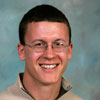
J. Michael Metzler, a first-year student from Charlotte, NC won the first prize, $400, for his paper titled “Removing the Trenches: A Conversation Between John Calvin and Menno Simons on the Effects of Ecclesiology on Excommunication.â€
First-year student Samuel Hernandez, of Harrisonburg, VA won the second place prize, $200, with his paper titled, “The Church, Religion and State Through the Eyes of Balthasar Hubmaier and Michael Sattler.â€
The Linden M. Wenger Anabaptist Studies Award recognizes outstanding student papers integrating Biblical and historical scholarship with pastoral application from an Anabaptist believers church perspective. Both these student’s submitted papers written for Christian Tradition II a required first-year course.
Linden Wenger served for many years as a professor on the faculty of EMS and as a leader within the Virginia Mennonite Conference.
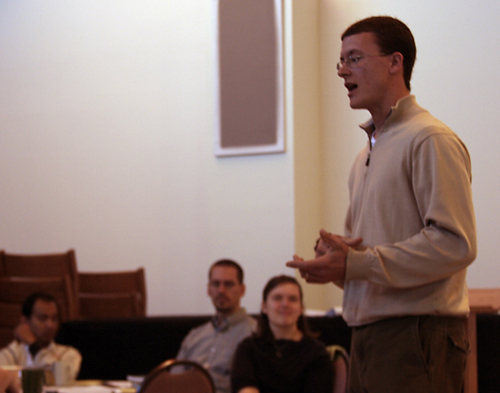
In an effort to encourage Eastern Mennonite Seminary students to study Anabaptist history, Walter and Leanne Smith of Clearwater, Florida, established the Linden M. Wenger Anabaptist Studies Award in 2001.”
Original aricle posted on 4/19/07 at http://www.emu.edu/seminary/features/lindenwengerÂ

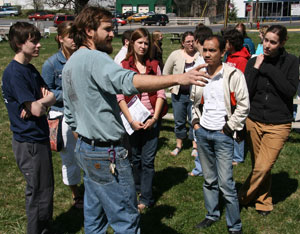
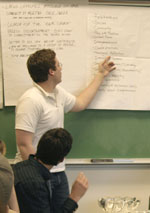 “We all have disagreements on all kinds of issues, but we pretend that doesn’t happen on Sunday morning or say we can’t talk about these in church,” said one person.
“We all have disagreements on all kinds of issues, but we pretend that doesn’t happen on Sunday morning or say we can’t talk about these in church,” said one person.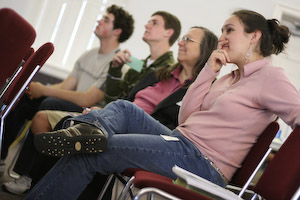 On Sunday, March 25, a group of 75-100 assorted youth, parents and young adults forsook their afternoon naps to gather at Franconia Mennonite Church for Why Object?, an event that included worship, discussion and pizza and was jointly sponsored by youth leaders from both the Franconia and Eastern District Conferences and the Peace and Justice Committee. Titus Peachey of
On Sunday, March 25, a group of 75-100 assorted youth, parents and young adults forsook their afternoon naps to gather at Franconia Mennonite Church for Why Object?, an event that included worship, discussion and pizza and was jointly sponsored by youth leaders from both the Franconia and Eastern District Conferences and the Peace and Justice Committee. Titus Peachey of 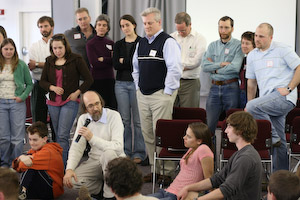 onflict between the Israelite nation and their neighbors the people of Aram in 2 Kings 6:8-23. Even from my lofty role as “King†in our spontaneous skit, I wrestled with the choice that lay in my hands as the conflict was not so much between people groups, but more so the clash between emotions over what God would ask of me and what the people would see as just. What choice was the best to make? Mercy didn’t quite make sense even with the wise counsel from our resident prophet Elisha. Yet in this account from Scripture mercy became the move that was made. The captured army was not only released unharmed they were also fed! The surprising result: Peace!
onflict between the Israelite nation and their neighbors the people of Aram in 2 Kings 6:8-23. Even from my lofty role as “King†in our spontaneous skit, I wrestled with the choice that lay in my hands as the conflict was not so much between people groups, but more so the clash between emotions over what God would ask of me and what the people would see as just. What choice was the best to make? Mercy didn’t quite make sense even with the wise counsel from our resident prophet Elisha. Yet in this account from Scripture mercy became the move that was made. The captured army was not only released unharmed they were also fed! The surprising result: Peace!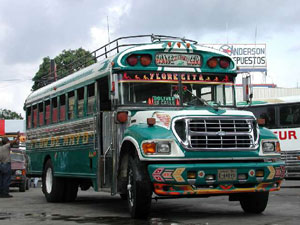 I chose to serve and that choice changed my life. Not to say that life would not have changed had I chosen a different path with different people. I ask, along with many of you: To serve or not to serve? When are we merely serving ourselves and when does our focus turn outwards? What causes the change of heart? What is required of us all as we profess Christ with our lives? I have often experienced the powerful pull of servant hood as it brings people into that buzzword of Christian faith today—community. I know it is often used and broadly defined, but I’m a fan. Service crosses boundaries–any time, any age. Doesn’t it need to? What other way can one willingly become part of a greater movement; a larger body of people?
I chose to serve and that choice changed my life. Not to say that life would not have changed had I chosen a different path with different people. I ask, along with many of you: To serve or not to serve? When are we merely serving ourselves and when does our focus turn outwards? What causes the change of heart? What is required of us all as we profess Christ with our lives? I have often experienced the powerful pull of servant hood as it brings people into that buzzword of Christian faith today—community. I know it is often used and broadly defined, but I’m a fan. Service crosses boundaries–any time, any age. Doesn’t it need to? What other way can one willingly become part of a greater movement; a larger body of people? Franconia Mennonite Conference (FMC) and
Franconia Mennonite Conference (FMC) and 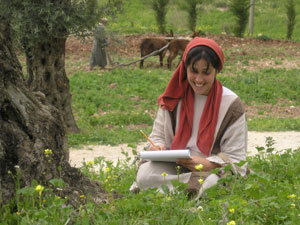
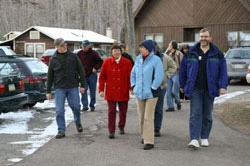 1. The classic 20th-century “Liberal – Conservative†continuum/dichotomy is being replaced with an “Established – Emergent†continuum/dichotomy. Diana Butler-Bass pictures the former continuum running horizontally, and the latter one running vertically. From my perspective this shift begins replacing the primary values/measures of historical theology and geography/proximity with effectiveness, relevance and organizational alignment as primary measures of affiliation.
1. The classic 20th-century “Liberal – Conservative†continuum/dichotomy is being replaced with an “Established – Emergent†continuum/dichotomy. Diana Butler-Bass pictures the former continuum running horizontally, and the latter one running vertically. From my perspective this shift begins replacing the primary values/measures of historical theology and geography/proximity with effectiveness, relevance and organizational alignment as primary measures of affiliation.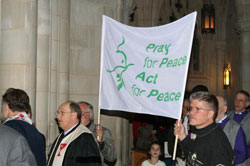 2. There is broad acknowledgement that current organizational assumptions—that are still largely based on 19th-century models focused on “control†and the implied assumption of “steady state†in a changing world—cannot handle 21st-century complexity and rate of change (with its need for quicker decision-making, prioritizing, partnering, etc.) along with the 21st-century corollary values focused on influence, transformation and authenticity. Much of the church’s structures are currently based around multiple specializations more than on collaboration toward one clear purpose. Interpersonal disputes and leadership challenges that turn personal are usually based on resulting matters of misalignment or inability to achieve organizational integration.
2. There is broad acknowledgement that current organizational assumptions—that are still largely based on 19th-century models focused on “control†and the implied assumption of “steady state†in a changing world—cannot handle 21st-century complexity and rate of change (with its need for quicker decision-making, prioritizing, partnering, etc.) along with the 21st-century corollary values focused on influence, transformation and authenticity. Much of the church’s structures are currently based around multiple specializations more than on collaboration toward one clear purpose. Interpersonal disputes and leadership challenges that turn personal are usually based on resulting matters of misalignment or inability to achieve organizational integration. 3. Related to number 2, there is a growing momentum for a holistic missional church vision that is fairly quickly replacing interest in the long-standing programmatic, silo-oriented structures. While this cognitive shift gains momentum, actually getting to this new place (organizationally and behaviorally) will continue to cause pain and hurt within congregations and other systems as folks sort through what to keep from the past and what to permit in the future. The best medicine is strong, honest, vulnerable, flexible, differentiated leadership and healthy processes that help the grass roots own the process along the way. Focusing on “change†(cognitive, rational) precedes but is not the same as “transition†(visceral, behavioral), which takes longer and is always harder.
3. Related to number 2, there is a growing momentum for a holistic missional church vision that is fairly quickly replacing interest in the long-standing programmatic, silo-oriented structures. While this cognitive shift gains momentum, actually getting to this new place (organizationally and behaviorally) will continue to cause pain and hurt within congregations and other systems as folks sort through what to keep from the past and what to permit in the future. The best medicine is strong, honest, vulnerable, flexible, differentiated leadership and healthy processes that help the grass roots own the process along the way. Focusing on “change†(cognitive, rational) precedes but is not the same as “transition†(visceral, behavioral), which takes longer and is always harder.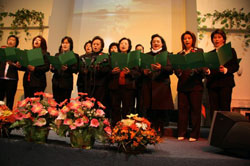 4. The role of the church will continue to move from the meetinghouse to the marketplace. Inquiring Anabaptists find there is a growing (and in some circles an almost popular) appetite for Christ’s Gospel of peace and a legacy of competence for practical peacemaking in a shrinking global village. Just as vast constituencies value Catholics for their deep heritage of discernment and education, Mennonites would do well to focus on the palpable interest in Anabaptist values. Sadly, this seems to be happening at a time when more than a few Anabaptist groups are struggling over their continuing efforts to live out the notions of community, mutual aid and nonviolence at a daily level (how we run our businesses, how we drive our cars, relationships with neighbors, etc.).
4. The role of the church will continue to move from the meetinghouse to the marketplace. Inquiring Anabaptists find there is a growing (and in some circles an almost popular) appetite for Christ’s Gospel of peace and a legacy of competence for practical peacemaking in a shrinking global village. Just as vast constituencies value Catholics for their deep heritage of discernment and education, Mennonites would do well to focus on the palpable interest in Anabaptist values. Sadly, this seems to be happening at a time when more than a few Anabaptist groups are struggling over their continuing efforts to live out the notions of community, mutual aid and nonviolence at a daily level (how we run our businesses, how we drive our cars, relationships with neighbors, etc.).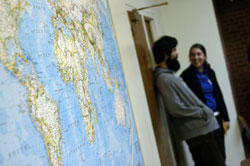 5. Measurements from the past centuries—including church membership, ordination, and clear organizational boundaries—will continue to become less important and relevant; while new measurements will become increasingly important in a world in which individuals and informal networks can hold businesses and even countries hostage, and unknown start-ups like
5. Measurements from the past centuries—including church membership, ordination, and clear organizational boundaries—will continue to become less important and relevant; while new measurements will become increasingly important in a world in which individuals and informal networks can hold businesses and even countries hostage, and unknown start-ups like